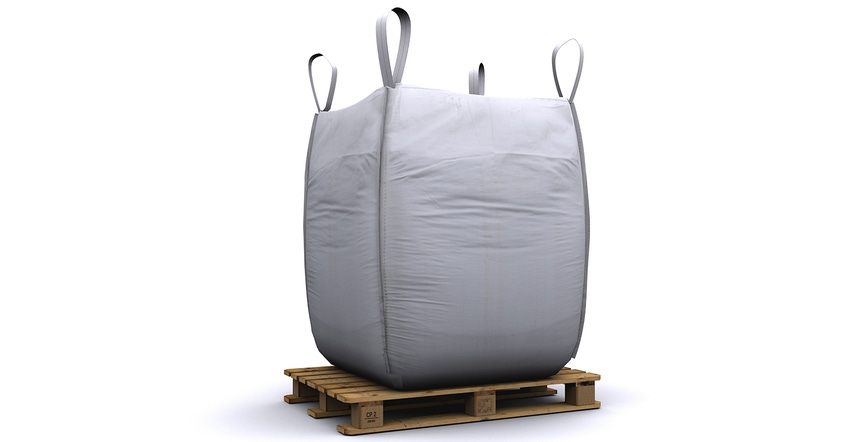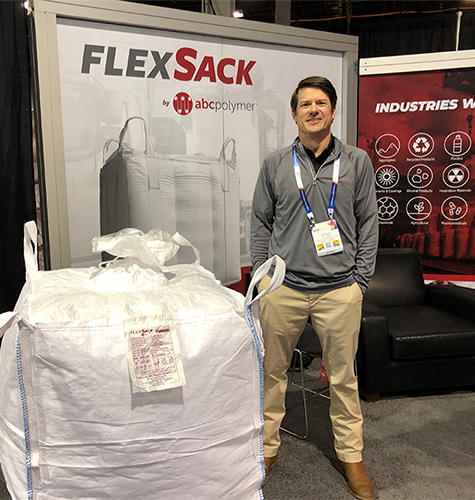Super-Size Bags Bulk Up Sustainably with Recycled Content
FlexSack’s new polypropylene “eco” flexible intermediate bulk containers (FIBCs) contain 30% recycled PP (rPP).
May 2, 2023

Remember when suppliers began adding post-consumer resin (PCR) to flexible packaging to make it more sustainable and more attractive to sustainably driven customers? Suppliers started with modest amounts and, in increments, increased that percentage of PCR to the point that, for example, pouches can now contain at least 85% PCR.
Now think of much larger flexible packaging that can hold many hundreds of pounds to several tons of dry product.
Bulk bags aka “super sacks,” known in the industry as flexible intermediate bulk containers (FIBCs), are now available with PCR.
|
I discovered the innovative new recycled-content bulk bag option in the booth of FlexSack, a division of ABC Polymer, during last week’s Powder Show.
The company’s 2023 introduction of the FlexSack-eco FIBC with 30% PCR brings a sustainable new option to the FIBC market.
“It represents the latest development of woven bags that evolved from a combination polyethylene bag sewn using nylon thread to 100% recyclable polypropylene bags,” explains Patrick Williams, the company’s national sales representative (shown at the event). �“The FlexSack-eco bag is 100% recyclable.”
Recycle-content FIBC bulk bag is likely a North America first.
FlexSack believes the recycled-content FIBC, which resulted from an internal sustainability initiative launched last year, is a first in North America.
Imported from India, the PCR bags are a drop-in replacement at a cost parity with standard PP bags.
“The eco-bags perform similarly to their 100% virgin PP counterparts,” says Allen Aubin, VP, director of sales & business development.
As with other FIBCS, the eco version holds up to 4,000 pounds of dry flowing powder or granular products ranging from plastic pellets and flakes to foods, pigments, pharmaceuticals, aggregates, chemicals, and more.
Numerous bulk bag options are available.
“There is no true ‘standard’ size when it comes to FIBCs, as each is dependent on the customer application,” says Aubin. “There are no limitations to style, construction, or other options for the eco-bags.”
The eco FIBCs are unsuitable for food contact, though use of a virgin PE liner makes them food-grade suitable, Aubin points out.
FIBC bulk bags are typically single-use plastic packaging.
What makes bulk bag recyclability such a critical aspect is that FIBCs are essentially single-use plastic packaging.
“Most FIBCs are rated as ‘single trip’ unless tested to a UN standard and certified as a multi-trip bag,” Aubin says. “Standard bags should be discarded after the initial fill and discharge of product. We do see bags frequently being re-used, but that would be done at the user’s discretion.”
We wondered if the PCR bags’ appearance is different from their virgin counterparts as with some other types of recycled-content packaging.
“This is dependent on the type and quality of the rPP material sourced,” responds Aubin. “Because most rPP is mixed color, there can be a slight discoloration of the rPP bags vs the standard PP counterparts. Greyish or off-white are the most common color variation.”
FlexSack anticipates a lukewarm reception to the eco FIBC bulk bag.
Despite companies’ keen interest in sustainability related goals, Aubin isn’t overly optimistic about companies willingness to embrace this sustainable new option.
“Expectations are low because most companies are hesitant to change,” he says. “However, there is always the threat of government mandates, similar to those imposed in the European Union recently, on imported plastics and plastic packaging, that could increase the demand for such a product.”
In addition to the 100% recyclable PP bag and new PCR bag option, FlexSack's other recent sustainability initiatives include…
Installation of solar panels on production facilities that reduce carbon emissions 20-fold versus coal power sources; and
Reduction of production waste from 8.4% to 6.9% in 2022 with a goal of less than 5%.
The Helena, AL-based company ships almost 1.5 million FIBCs yearly to customers throughout the US and North America.
You May Also Like



